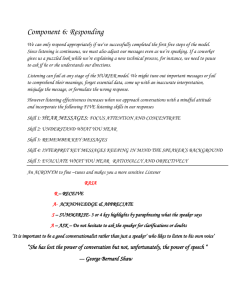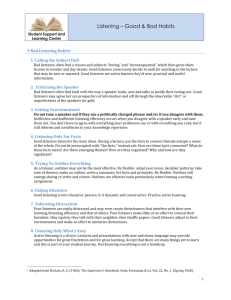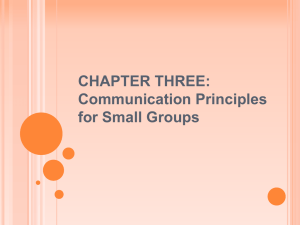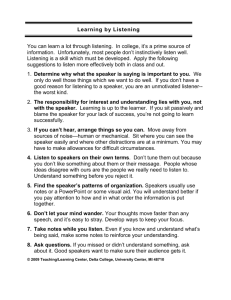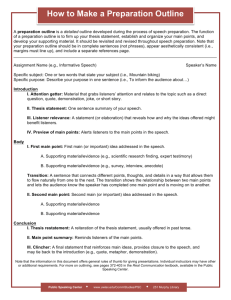WHAT CAN BE DONE ABOUT LISTENING Ralph G. Nichols The
advertisement
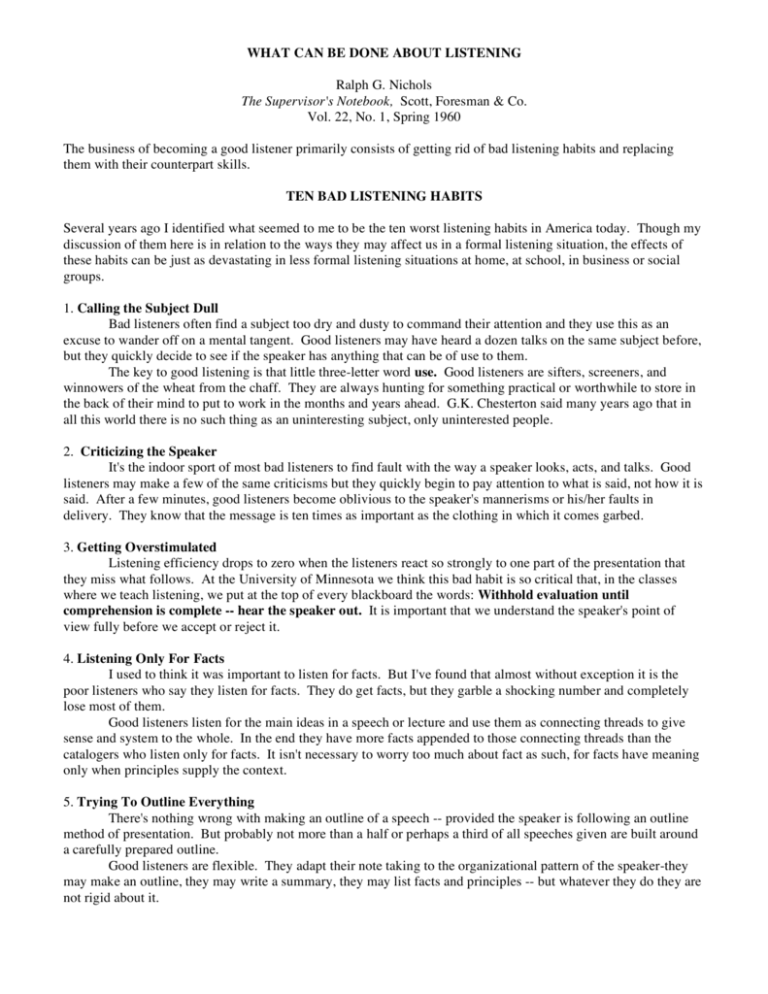
WHAT CAN BE DONE ABOUT LISTENING Ralph G. Nichols The Supervisor's Notebook, Scott, Foresman & Co. Vol. 22, No. 1, Spring 1960 The business of becoming a good listener primarily consists of getting rid of bad listening habits and replacing them with their counterpart skills. TEN BAD LISTENING HABITS Several years ago I identified what seemed to me to be the ten worst listening habits in America today. Though my discussion of them here is in relation to the ways they may affect us in a formal listening situation, the effects of these habits can be just as devastating in less formal listening situations at home, at school, in business or social groups. 1. Calling the Subject Dull Bad listeners often find a subject too dry and dusty to command their attention and they use this as an excuse to wander off on a mental tangent. Good listeners may have heard a dozen talks on the same subject before, but they quickly decide to see if the speaker has anything that can be of use to them. The key to good listening is that little three-letter word use. Good listeners are sifters, screeners, and winnowers of the wheat from the chaff. They are always hunting for something practical or worthwhile to store in the back of their mind to put to work in the months and years ahead. G.K. Chesterton said many years ago that in all this world there is no such thing as an uninteresting subject, only uninterested people. 2. Criticizing the Speaker It's the indoor sport of most bad listeners to find fault with the way a speaker looks, acts, and talks. Good listeners may make a few of the same criticisms but they quickly begin to pay attention to what is said, not how it is said. After a few minutes, good listeners become oblivious to the speaker's mannerisms or his/her faults in delivery. They know that the message is ten times as important as the clothing in which it comes garbed. 3. Getting Overstimulated Listening efficiency drops to zero when the listeners react so strongly to one part of the presentation that they miss what follows. At the University of Minnesota we think this bad habit is so critical that, in the classes where we teach listening, we put at the top of every blackboard the words: Withhold evaluation until comprehension is complete -- hear the speaker out. It is important that we understand the speaker's point of view fully before we accept or reject it. 4. Listening Only For Facts I used to think it was important to listen for facts. But I've found that almost without exception it is the poor listeners who say they listen for facts. They do get facts, but they garble a shocking number and completely lose most of them. Good listeners listen for the main ideas in a speech or lecture and use them as connecting threads to give sense and system to the whole. In the end they have more facts appended to those connecting threads than the catalogers who listen only for facts. It isn't necessary to worry too much about fact as such, for facts have meaning only when principles supply the context. 5. Trying To Outline Everything There's nothing wrong with making an outline of a speech -- provided the speaker is following an outline method of presentation. But probably not more than a half or perhaps a third of all speeches given are built around a carefully prepared outline. Good listeners are flexible. They adapt their note taking to the organizational pattern of the speaker-they may make an outline, they may write a summary, they may list facts and principles -- but whatever they do they are not rigid about it. 6. Faking Attention The pose of chin propped on hand with gaze fixed on speaker does not guarantee good listening. Having adopted this pose, having shown the overt courtesy of appearing to listen to the speaker, the bad listener feels conscience free to take off on any of a thousand tangents. Good listening is not relaxed and passive at all. It's dynamic; it's constructive; it's characterized by a slightly increased heart rate, quicker circulation of the blood, and a small rise in bodily temperature. It's energy consuming; it's plain hard work. The best definition I know of the word attention is a "collection of tensions that can be resolved only by getting the facts or ideas that the speaker is trying to convey." 7. Tolerating Distraction Poor listeners are easily distracted and may even create disturbances that interfere with their own listening efficiency and that of others. They squirm, talk with their neighbors, or shuffle papers. They make little or no effort to conceal their boredom. Good listeners try to adjust to whatever distractions there are and soon find that they can ignore them. Certainly, they do not distract others. 8. Choosing Only What's Easy Often we find the poor listeners have shunned listening to serious presentations on radio or television. There is plenty of easy listening available, and this has been their choice. The habit of avoiding even moderately difficult expository presentations in one's ensure-time listening can handicap anyone who needs to use listening as a learning tool. 9. Letting Emotion-Laden Words Get In The Way It is a fact that some words carry such an emotional load that they cause some listeners to tune a speaker right out: such as, affirmative action and feminist-they are fighting words to some people. I sometimes think that one of the most important studies that could be made would be the identification of the one hundred greatest trouble-making words in the English language. If we knew what these words were, we could ring them out into the open, discuss them, and get them behind us. It's so foolish to let a mere symbol for something stand between us and learning. 10. Wasting the Differential Between Speech and Thought Speed Americans speak at an average rate of 125 words per minute in ordinary conversation. A speaker before an audience slows down to about 100 words per minute. How fast do listeners listen? Or, to put the question in a better form, how many words a minute do people normally think as they listen? If all their thoughts were measurable in words per minute, the answer would seem to be that an audience of any size will average 400 to 500 words per minute as they listen. Here is a problem. The differential between the speaker at 100 words per minute and the easy thought speed of the listener at 400 or 500 words per minute is a snare and a pitfall. It lures the listener into a false sense of security and breeds mental tangents. However, with training in listening, the difference between thought speed and speech speed can be made a source of tremendous power. Listeners can hear everything the speaker says and not what s/he omits saying; they can listen between the lines and do some evaluating as the speech progresses. To do this, to exploit this power, good listeners must automatically practice three skills in concentration: Anticipating the next point. Good listeners try to anticipate the points a speaker will make in developing a subject. If they guess right, the speaker's words reinforce their guesses. If they guess wrong, they'll have to do some thinking to discover why they and the speaker failed to agree. In either case, their chances of understanding and remembering what was said is nearly double what it would have been if they had simply listened passively. Identifying supporting material. Good listeners try to identify a speaker's supporting material. After all, a person can't go on making points without giving listeners some of the evidence on which the conclusions are based, and the bricks and mortar that have been used to build up the argument should be examined for soundness. Recapitulating. With the tremendous thought speed that everyone has, it is easy to summarize in about five seconds the highlights covered by a speaker in about five minutes. When the speaker stops to take a swallow of water or walks over to the blackboard to write something or even takes a deep breath, the experienced listener makes a mental summary. Half a dozen summaries of the highlights of a fifty-minute talk will easily double the understanding and retention important points in a talk. ©Academic Skills Center, Dartmouth College 2001


